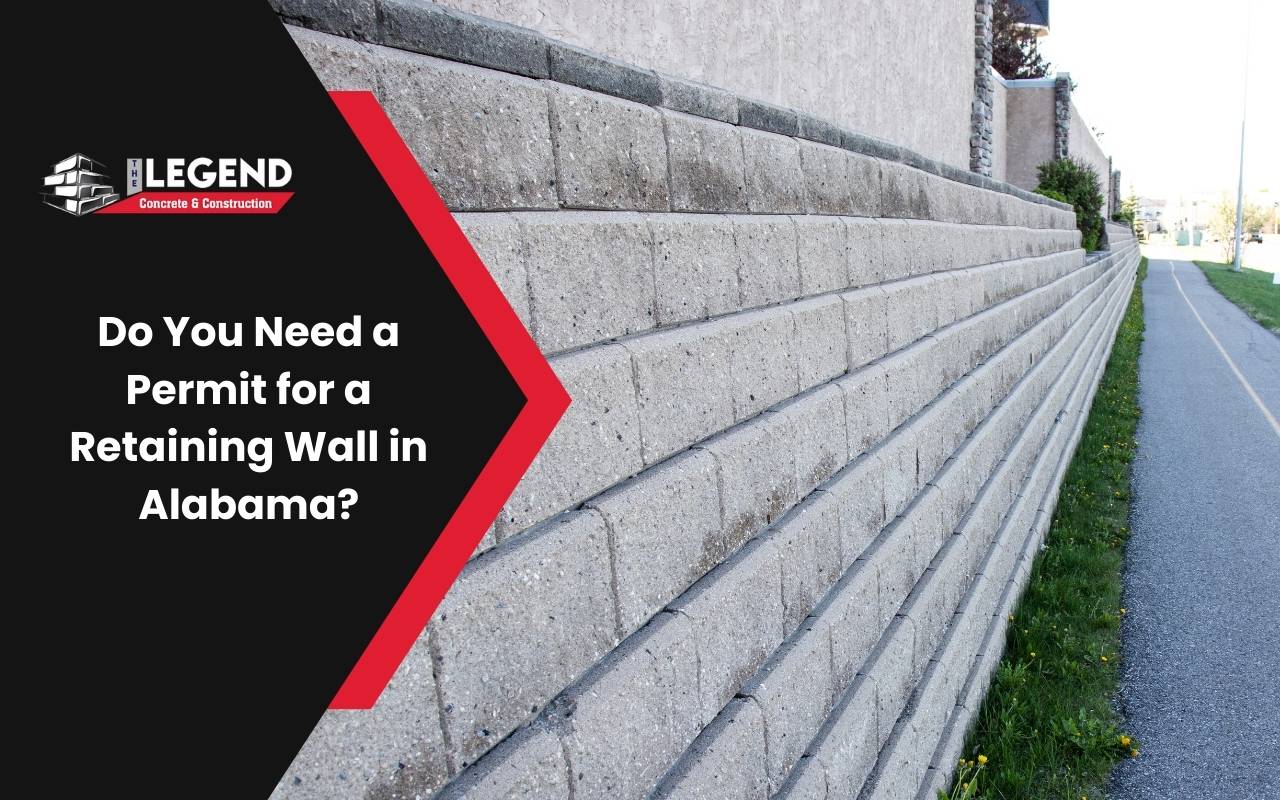
Building a retaining wall can transform your landscape, prevent erosion, and create usable outdoor spaces. However, amid the excitement of designing and constructing your perfect outdoor area, there is a critical step that many overlook: understanding the legal requirements involved. In Alabama, the process is not just about stacking stones or pouring concrete; it’s about navigating the maze of retaining wall permits Alabama. Whether you are a seasoned DIY enthusiast or a homeowner seeking professional help, knowing the rules can save you time, money, and legal headaches.
Regulations around retaining wall construction are detailed, with specific height limits and setback rules that must be followed. Failing to secure the necessary permits can result in fines or even dismantling your project. Some walls may even require an engineer’s stamp to ensure safety and compliance. This guide explains the essentials of retaining wall permits Alabama so you can confidently move forward with your construction.
Understanding Retaining Wall Permit Requirements in Alabama
Building a retaining wall involves more than stacking stone or pouring concrete. Before breaking ground, you need to know when and why permits are required. Across Alabama, rules are enforced by local building departments, zoning boards, and sometimes watershed protection agencies.
Some jurisdictions allow small walls under a certain height without permits. Others require detailed applications for walls that may affect safety, drainage, or nearby properties. When researching retaining wall permits Alabama, consult your county or city’s building division website. Applications often require site plans, elevations, drainage solutions, and compliance with stormwater rules. In some cases, an engineer’s stamp is mandatory. Without it, you may face stop-work orders or forced redesigns.
Height Restrictions for Retaining Walls in Alabama
- Most areas regulate walls by vertical exposed height.
- Four feet is a common trigger for requiring permits.
- Walls above six feet often need an engineer’s stamp.
Height limits are crucial. Walls over a certain size present risks such as collapse, drainage failure, or soil pressure issues. By respecting limits and working with engineers when needed, you protect your property and avoid legal trouble.
Setback Rules for Retaining Walls in Alabama
Setback rules govern how close a retaining wall can be to property lines or easements. In Alabama, these vary by city or county. Some require just inches of clearance, while others mandate several feet, especially near sensitive areas like floodplains. Always confirm local zoning codes before finalizing placement.
If your wall infringes on setbacks, you may need a variance or easement. Working with a surveyor ensures compliance and helps avoid disputes later.
Importance of Securing Permits for Retaining Wall Construction
- Permits confirm compliance with safety and zoning regulations.
- They protect you from liability if damage occurs.
- Inspections reduce risks of collapse or drainage failure.
Skipping permits may seem faster, but it can lead to fines and forced removal. Investing time in permits saves resources and offers peace of mind.
Process of Obtaining a Retaining Wall Permit in Alabama
The permitting process begins by gathering requirements from your local building department. You’ll likely need detailed site and structural plans, showing property lines, elevations, drainage, and materials. Once submitted, plans are reviewed for compliance. Some projects require an engineer’s stamp. After approval, inspections will follow key stages of construction. Understanding the sequence ensures a smoother timeline.
Role of Professional Engineers in Retaining Wall Projects
Professional engineers ensure walls can withstand soil, drainage, and load conditions. In Alabama, regulations often mandate an engineer stamp for taller walls or complex sites. Engineers provide soil analysis, calculate loads, and design drainage systems. Their involvement not only meets legal requirements but also extends the life of your structure.
Common Mistakes to Avoid When Getting a Retaining Wall Permit
- Submitting incomplete or inaccurate site plans.
- Ignoring proper drainage details in applications.
- Failing to obtain an engineer stamp when required.
These errors cause delays, rejections, or redesigns. By avoiding them, you streamline approval and construction.
Cost Considerations for Retaining Wall Permits in Alabama
Permit costs vary by jurisdiction. Factors include wall height, complexity, and engineering needs. Professional fees for engineers and surveyors add to costs. However, professional support reduces long-term expenses and ensures safety. Budgeting for permits and experts prevents surprises and keeps your project on track.
Ensuring Compliance with Local Codes and Regulations
Compliance starts with researching local codes and stormwater rules. Requesting a pre-application meeting with planning staff helps clarify requirements. During construction, schedule inspections at key phases. Keeping records of stamped drawings and reports helps if issues arise. Consistent communication with officials ensures long-term compliance.
FAQs About Retaining Wall Permits in Alabama
Do all retaining walls need permits in Alabama?
Not all, but walls above certain heights or near sensitive zones usually do.
When is an engineer stamp required?
Often when walls exceed four to six feet or when site conditions are complex.
Can I build a wall on a property line?
Usually no, as setback rules apply. Always verify local codes first.
What happens if I skip getting a permit?
You may face fines, work stoppages, or even wall removal.
Where can I start the permit process?
Contact your local building department or zoning office for applications and guidance.
Navigating retaining wall permits Alabama requires knowledge of height rules, setbacks, and engineer involvement. With proper planning, you ensure safety, durability, and compliance. To get expert help with construction or permitting, explore our services. For personalized guidance, connect with our team directly through our contact page today.
